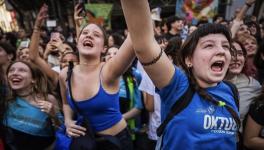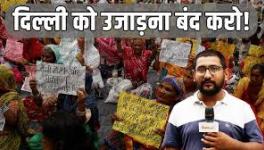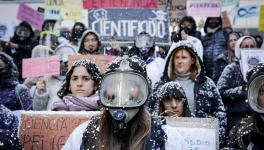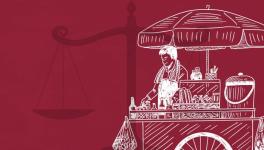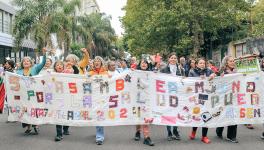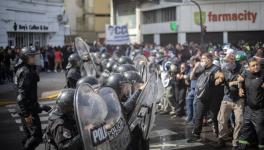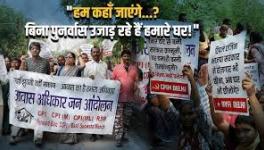The Resistance of Senegalese Street Vendors
Senegalese worker in Barcelona. Photo: TopManta
With respect to the wave of anti-racist protests in the US, we reviewed the experiences of Senegalese workers on two different parts of the world. On the one hand, street vendors in the city of Buenos Aires -organized in the CTEP- who struggle everyday to survive the world of the street, police abuse and social indifference. And on the other hand, the group that created the TopManta brand, a textile venture in Barcelona that defends the genuine work of immigrants and produces a clothing line with an anti-slavery stamp.
The first attempts to reach them by phone were all unsuccessful. Alpha had meetings at the CTEP for housing issues, was busy in some social service or was preparing bags of essential items for his compatriots. The pandemic -and also the measure adopted to curb the impact of the disease i.e. the quarantine- hit the heart of the popular economy.
For those who make a living from street vending, this unprecedented quarantine turned their lives upside down. If we add to this the language barrier, the lack of proper housing (usually hotel rooms with little infrastructure, shared by several people), the cultural remoteness and the social indifference, the situation becomes more dramatic.
The question of documentation -summarized in the term “having papers”- is the first point in the series of linked difficulties; such as banking or obtaining rents at market prices and not being exposed to the abuses of seedy guesthouse owners. “If you don’t have an ID, they won’t pay attention to you,” said Alpha using a colloquial Buenos Aires phase with a French touch in his accent. “So the kids have no other option but to be on the street. If you don’t want to sleep on the street, you have to pay the rent and for that you have to do something,” he added.
Getting together, combining experiences -and the desire to succeed- collectively is the only safe-passage. In short, as it is popularly said, organizing is the only way out. Activism is not always inserted in places where help is apparently needed, sometimes it is the other way around. In 2017, Alpha and three other colleagues knocked on the door of the CTEP (Confederation of Popular Economy Workers, now converted into UTEP) in the Constitución neighborhood in Buenos Aires. It is a neighborhood of immigrants, hotels and evictions, street vendors and businesses of all kinds. Constitución offers one of the busiest and most chaotic scenarios in the city.
“One day, a group of three or four Senegalese men approached the door of the CTEP requesting representation in the union because they were not able to work. Seeing the actions of our organization in different places, in the defense of the scrap collectors or street vendors when they were in problem, they said: they wanted to have a union to defend them,” explained Nicolás Caropresi, a member of the UTEP and a leader of the MTE (Excluded Workers’ Movement).
The confederation tried to provide them with tools for the most urgent and concrete issues such as the strengthening of the union, union training, procedures, drafting of bills and proposals for laws to facilitate access to documentation.
“They are clear victims of a persecution with a very strong racist tinge and burden, where usually the viciousness is much greater with Africans or Senegalese people than with the rest of the street vendors. At the same time, they are like the avant-garde that defends the street in spite of everything because they have no other option of earning income than from street vending. They defend their work tooth and nail,” said Nicolás.
Language is another recurring problem. The inability to communicate always makes things worse. That’s why the confederation began organizing Spanish courses with the help of the University of Buenos Aires and other institutions, along with trade-specific training and courses.
Alpha is a name of African origin whose etymology means “leader”. He arrived in Argentina in 2015, along with Macrism, although without knowing it. Like virtually everyone else, Alpha had someone he knew in the country: a brother, who had arrived in 2014 and a cousin, who had come in 2012. One of the main reasons why he arrived in Argentina was that he wanted to travel the world and know different cultures, a dream that he continues to cherish and wishes to fulfil at some point when he has saved enough and he can move ahead. “It’s a destination, I can’t stay in one place for long,” he said.
He is 34 years old, has a wife and two children in Senegal: a 10-year-old girl and a-six-and-an-half-year-old boy. The last time he saw them was last summer: he spent a few months in his homeland but decided to return to Argentina, and landed again in the Constitución neighborhood on March 18, two days before the coronavirus pandemic closed the borders of almost every country indefinitely.
From the beginning, his arrival in Argentina was far from being a dream. He spent around 7,000 USD on the various transfers that are usually mediated by “contacts” that allow -in exchange for large amounts- to surf the porous Argentine border. Alpha, like so many others, entered this country through Misiones, on the border with Brazil. “You know how it is, with taxis and everything, most of the people entered that way,” Alpha described the experience. It is known that there are boats, there are walkers, and just as drugs or electronic items are smuggled, people are moved. Alpha travelled to Buenos Aires -his final destination- by bus.
In Diourbel, the city Alpha is from, he worked on tourism-related issues. “I am a truck driver and tourism agent in French,” he said and pointed out that he became the owner of his own vehicle, which he had to sell to invest in the journey that brought him to these shores.
Alpha’s pre-pandemic routine also included Monday meetings to read the Quran as part of his social and religious life. Like almost 85% of the Senegalese people, Alpha is Muslim. “There are a lot of Muslims who live here and on Fridays we go to the mosque,” he said. Due to the strict diet they follow because of their religious beliefs, they find the bags of essential items, which the UTEP has been delivering to thousands of families who do not have enough to feed in quarantine, more useful than eating in the community canteens. “A lot of the kids don’t want to eat in the community canteens, so they prefer to have the bags,” Alpha explained.
Macri’s government was not a pro-workers’ government, and in the case of immigrants without papers, the situation was even worse. The images of the violent arrest of several Senegalese street vendors circulated widely in September 2018, which included the arrest of the union leader Juan Grabois by the local police. “The level of arbitrariness in our country has reached an intolerable degree. A group of young people came to defend the street workers who are trying to earn their bread from their own work and efforts in the context of a deep economic crisis,” Grabois explained at the time.
But it was neither the first nor the last manifestation of harassment towards the sector. They suffer abuse every day and at all times. A report from the Centre for Legal and Social Studies (CELS) of the same year chronicles the police abuse on April 14, 2018 in the Flores neighborhood, as a totally disproportionate City Police operation with the arrest of at least 20 people.
In addition, in Buenos Aires, last December the amendment of the Contravention Code was approved in the city legislature, which implied, among other things, the possibility of carrying out preventive detentions for 48 hours without communicating it to the judge or prosecutor; accepting the police versions as “sufficient evidence”; the non-mandatory medical review to detect illegal attacks; and even treating as criminal offenses what until a day before were simply violations. Since March 1, street vendors have also been dealing with this new reality.
Perhaps the last event of the abuse against Senegalese vendors that caught media attention occurred on June 11. The Buenos Aires police arrested Mbacke Ndaw, a Senegalese migrant who has been in the country in the city of La Plata for only six months, who doesn’t know Spanish and has no job or option other than going out to sell on his own. In the subsequent statement, Mbacke claimed that he was caught in such a way that he “couldn’t breathe”: the George Floyd method extended to all latitudes.
Barcelona is not only about Messi
“It was harder than I thought,” Mansour said. “I thought anyone could come here for two years, would have what they want, and then would return. But it hasn’t been like that,” he lamented. Mansour first arrived in Barcelona, Catalonia, in 2007. He had imagined that in a couple of years he would be able to raise money, settle in, and return to his homeland to his wife and children, who are still waiting for him on the other side of the ocean. One of the most cosmopolitan cities in the world houses endless stories. The world of immigration -of the legal and the other- is not the bright and humorous part of the city that never sleeps.
Like other Africans, Mansour arrived in a boat; a small wooden boat without a deck, just as we imagine or see them in the movies. He was chosen as the captain of that boat trip of which he prefers not to talk much about, neither of the suffering, nor of the sea that eats bodies. The journey was not direct. Its first destination in Spain was the small city of Tenerife, in the Canary Islands.
The first question I asked him was a reflection of how Western countries refer to people who -according to current laws- do not have the permits to stay in these places. And despite having been made from a more humanitarian conception, it was wrong. Mansour quickly and clearly replied: “Without papers? There are no people without papers, there are no illegal people. Everyone has paper, we have from our countries, in our languages.” The “illegality” of the immigrant is not a convention that respects the basic human right to exist and be treated as an equal, just because they are a person. “That is the way they run the world, and it’s a false world. Governments are more criminal than those who they call are criminals,” he concluded with a tired voice.
Mansour gives history and geopolitics to anyone who wants to listen to him. “All the black people you see in the world are Africans, they have been stolen from their people, they have been taken out on ships like slaves, and because they can no longer steal people, they take away their resources” said Mansour. He also explained that in Africa they are being killed for their natural resources, their common goods. “We are very rich, we are not poor,” he said.
After three years of living in the Iberian country, Mansour was able to minimally normalize his situation, and thanks to a friend from Zaragoza he managed to obtain the blessed local permit. He was also able to return to his country in 2010, and meet his family. However, now he no longer has papers and his bank account is at zero. He doesn’t know when he’ll be able to go back to Senegal or see his family. And it’s been a long time.
“TopManta” is the name by which street vendors are known who are distributed in the central and tourist streets of Barcelona and sell the famous “copies” of leading clothing brands. They are TopManta’s products -which look exactly like those of the original company- but the tags they display have the brand that sells very quickly as these vendors are easily subjected to harassment by the Urban Guard, the Mossos d’Esquadra, the Port Police and other control bodies that circulate in the city.
The death of Mor Sylla, a 50-year-old Senegalese man who fell from the balcony of the apartment where he lived after a police raid by the Mossos d’Esquadra (autonomous police force of Catalonia) in August 2015, served as the push to organize as a union. With anger in their blood, but also the certainty of being able to create new realities for thousands of compatriots who arrive everyday in Barcelona, the People’s Union of Street Vendors/Manteros of Barcelona was formed that same year, which had among its first objectives to fight against the police abuse.
Two years later, the TopManta brand was born on the union’s proposal. It took the name that socially grouped together the street vendors/first copy clothes sellers/illegal citizens to resignify them in a political message of struggle and resistance in favor of the lives of migrants.
The store, located in the El Raval neighbourhood in Barcelona, offers different kinds of t-shirts, cloth bags, jackets, pants and even sandals. The prints are designed by the workers themselves, with drawings and associated phrases such as “Legal clothing by illegal people.” Another of the most common prints is a panther that crouches forward with “Black Manters” written around it, resembling the logo of the strong historical Black Panther Party, the socialist political movement of Black and Afro vindication that emerged in the mid-1960s in the United States.
“We launched the brand in 2017 with some artists from Brazil. The presentation event was very successful and media came from all over the world. The demand for clothes went up, but we didn’t even have money to start. We sought the money by cooking in the neighborhood parties to be able to finance ourselves,” explained Lamine Sarr, one of the members of the collective in an interview with the Catalan magazine “Jovent”.
Later a local digital magazine -excited about the idea- approached them and proposed to launch a crowdfunding campaign. With the proceeds, they bought machines and tools to learn the screen printing process; all the necessary steps to set up the dream that does not end up in making clothes, but in creating a cooperative that serves as the grassroot organization for the manteros/street vendors who arrive to have a “contract” (job) and can at least be registered. It’s a way to make the immigrants “legal” and provide them with the slightest chance of survival in the face of a state that doesn’t seem to be interested, and whose immigration law requires living at least 3 years in Spain to begin any residency process.
In Barcelona, the raids are constant. The struggle with different security forces, pressure from several merchants, far-right political groups and certain media organizations generates the ideal situation for operations that include acts of violence, mistreatment and racism.
“The issue is not the manteros or the occupation of public space. The issue is that the poor people cannot occupy the public space, but the rich people, yes,” said Sarr. He indicated that there are not a few sectors that are abused and associated with insecurity and crime. “They want us there where they can have someone to blame. What matters is to grow fascism and divide. It’s what they have left, they have no solution. They try to scare people and generate insecurity,” he added.
In Catalan newspapers, on July 9, it was read that the manteros had returned to the streets of the city. “The people of Barcelona fear that this illegal business will gain ground and get out of control again as in the previous years,” read the headline of a report by Barcelona Metròpolis magazine, referring to the halt generated by the COVID-19 pandemic around the world, especially in the most touristic areas. Although the portal noted that “street vendors do not carry any protection against the COVID-19,” it avoided mentioning in its article how difficult it could have been to survive a quarantine without access to any resources.
“We are here to recover what we have been robbed of”
Both Alpha and Monsour are from Senegal, a country on the African continent. The population is nearly 16 million. It shares its borders with the North Atlantic Ocean, Guinea, New Guinea, Mauritania and Mali. Almost as embedded within Senegal is the small country, Gambia, which despite having one of the most fertile lands, today occupies one of the lowest rates in human development.
The official language of Senegal is French and is widely spoken, despite the fact that the country became independent in 1960 from the European power that had it under its empire for at least 110 years (although, the commercial presence and exploitation of the French empire continued till at least the mid-17th century). Likewise, the national language is the Wolof and several other local or ethnic languages are also spoken.
In Argentina, we know little or nothing about this country, like the rest of the black continent. The largest Senegalese community is located in France, although the places of greater arrival in recent years are the regions of Catalonia in Spain, and Lombardy in Italy.
Argentina doesn’t have negligible numbers. It is difficult to calculate the exact figure because the majority is “undocumented” so they are not part of any statistics. The UTEP estimates that there are currently between 9,000 and 12,000 Senegalese people across Argentina. Like all his fellow compatriots, Alpha dreams of a better life, but is always at the forefront of the fight for his rights. “I imagine having a good future, a good job. I imagine myself continuing to fight for my colleagues,” he said with a smile.
In July 2019, Mansour asked me to take a TopManta t-shirt for his brother, who left years ago to try his luck in Buenos Aires. He chose the size, wrote his name on a piece of paper and gave it to me. He had no address to give me, nor a way to communicate with his brother, but he assured me that I would find him by his name. I looked at him in shock, afraid of the fact that the task would be impossible. I still have it stored in an envelope, waiting to find its owner; so far all attempts have been in vain. Who knows if this note finally succeeds.
English translation by Tanya Wadhwa
Courtesy: Peoples Dispatch
Get the latest reports & analysis with people's perspective on Protests, movements & deep analytical videos, discussions of the current affairs in your Telegram app. Subscribe to NewsClick's Telegram channel & get Real-Time updates on stories, as they get published on our website.









